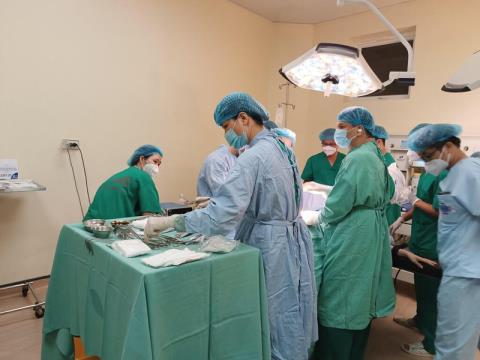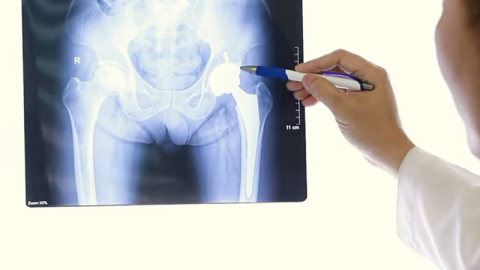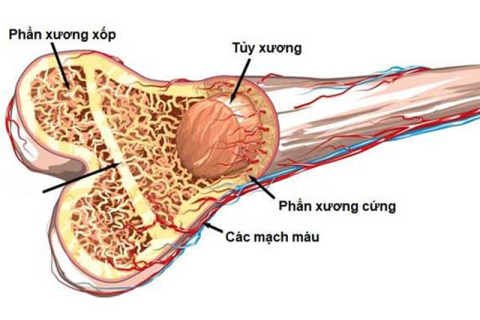Diabetes is a dangerous metabolic disorder not only encountered in adults but also in infants and children. Many parents wonder what is hyperglycemia in babies and how does it manifest? Let's learn about this health topic with SignsSymptomsList!
Neonatal hyperglycemia occurs when your baby's blood sugar is above the normal range. Symptoms of the disease at an early stage are often overlooked, making neonatal diabetes difficult to detect and treat promptly. Most of the time, when the child is taken to the doctor, the disease has progressed to a severe stage.
Overview of neonatal diabetes
What is neonatal hyperglycemia?
Neonatal hyperglycemia is a condition in which a child's blood sugar level is higher than normal. This is a fairly common problem in babies and needs proper care to avoid health problems in the baby.
The cause of neonatal hyperglycemia can be due to many factors such as maternal diabetes during pregnancy, pregnancy, steroid use during pregnancy or premature birth.
Premature babies often have low blood sugar because their organs and functions are not fully developed. When a baby is born, a baby's blood sugar can rise suddenly, causing neonatal hyperglycemia.
Experts divide neonatal diabetes into three main groups, including:
- Transient Neonatal Diabetes Mellitus (TNDM).
- Permanent Neonatal Diabetes Mellitus (PNDM).
- Syndromic diabetes mellitus (NDM - Syndromic).
Neonatal hyperglycemia can have a wide range of effects on a child's health. If not detected and treated in time, children can have serious health problems such as seizures , heart failure, neurological disorders or an increased risk of death.

Neonatal hyperglycemia is relatively rare
Diagnosis and treatment of disease
This disease is often difficult to detect and diagnose because the symptoms present are nonspecific and are easily overlooked until the child has progressed to more severe manifestations such as lethargy, lethargy or coma.
To diagnose hyperglycemia in an infant, your doctor will measure your baby's blood sugar and watch for symptoms such as muscle tremors, inactivity, or dizziness. However, the treatment of diabetes in infants is relatively difficult because this is the period when children need to be provided with adequate nutrition.
Therefore, children during treatment will have to have regular blood tests, use drugs regularly, at the right time and in the right dose to ensure that the treatment is effective, without affecting the child's future health.
To prevent neonatal hyperglycemia, pregnant women need to maintain a healthy diet and lifestyle. Pregnant women with gestational diabetes should take special care to ensure that their blood sugar levels are well controlled. In addition, premature babies need special care and regular blood sugar checks.
In addition, parents need to take their children for regular health check-ups and create a healthy living environment for them, ensure a balanced and nutritious diet, avoid using too much sugar, foods and beverages. sweets and sugary drinks.

Children will need regular blood tests to monitor the disease
Manifestations of hyperglycemia in infants
Hyperglycemia in infants can have many different manifestations, depending on the blood sugar levels and the state of the child. However, some general signs that are common in infants with hyperglycemia include:
- Slow weight gain: This is a characteristic sign of high blood sugar in children. Because the baby's body cannot convert glucose into active energy. Therefore, the body will break down protein and fat to create an energy source for cell growth. This will make it difficult for the baby to gain weight despite being fully breastfed.
- Thirst: Children often show signs of drinking a lot, often thirsting for water and urinating many times a day. Because the high content of glucose in the blood vessels causes water to withdraw from the cells for homeostasis. This will stimulate the baby's thirst center, causing the baby to demand more feed.
- Gastrointestinal disorders : Newborns with hyperglycemia may not digest well, are often constipated, or have other symptoms such as diarrhea, nausea, irritability, and heartburn.
- A lot of fussing: When a child is often upset, restless or crying often can be a sign of health instability, parents need to pay attention and take the child to the doctor soon.
These are symptoms that are easily confused with other diseases. Therefore, when their children have abnormal symptoms, parents need to take their children to a specialist doctor for a clinical examination and order the necessary paraclinical tests to accurately diagnose the disease.

A baby who wants to suckle a lot is a sign of neonatal diabetes
Treatment when the baby has high blood sugar
When a baby has hyperglycemia, prompt treatment measures must be taken to avoid negative effects on the baby's health. Here are some ways to deal with your baby's high blood sugar:
- Use insulin: In some cases, your baby needs to use insulin to lower blood sugar. The doctor will guide parents about the dose, time of injection as well as how to inject insulin for the baby or let the baby use an automatic insulin injection machine.
- Monitor blood sugar regularly: Parents need to monitor their baby's blood sugar level by using a blood glucose meter to check their baby's blood sugar daily and notify the treating doctor. Through fluctuations in blood sugar index, doctors offer timely treatment measures in accordance with disease progression.
- Take care of overall health: Parents need to make sure that their baby's overall health is taken care of by keeping them clean and comfortable, making sure they get enough sleep, doing fun activities, and reducing stress. nervous tension.
- Change in diet: For babies over 6 months old, you can consult your doctor or nutritionist to adjust your baby's diet. Avoid giving your baby too much sugar, starch and foods containing fat. Instead, give your baby plenty of fresh vegetables, fruits, and fiber-rich foods.

Make sure your baby always gets enough sleep
In summary, the treatment when the baby has hyperglycemia should be done promptly and with the guidance of a doctor or nutritionist to ensure that the baby's health is protected and best developed.
Above is an article by SignsSymptomsList about hyperglycemia in babies. Hopefully with the article, you can know the basic information about the signs to recognize the disease as well as how to handle it when your child has neonatal diabetes. Stay tuned for more health articles on the SignsSymptomsList website!












